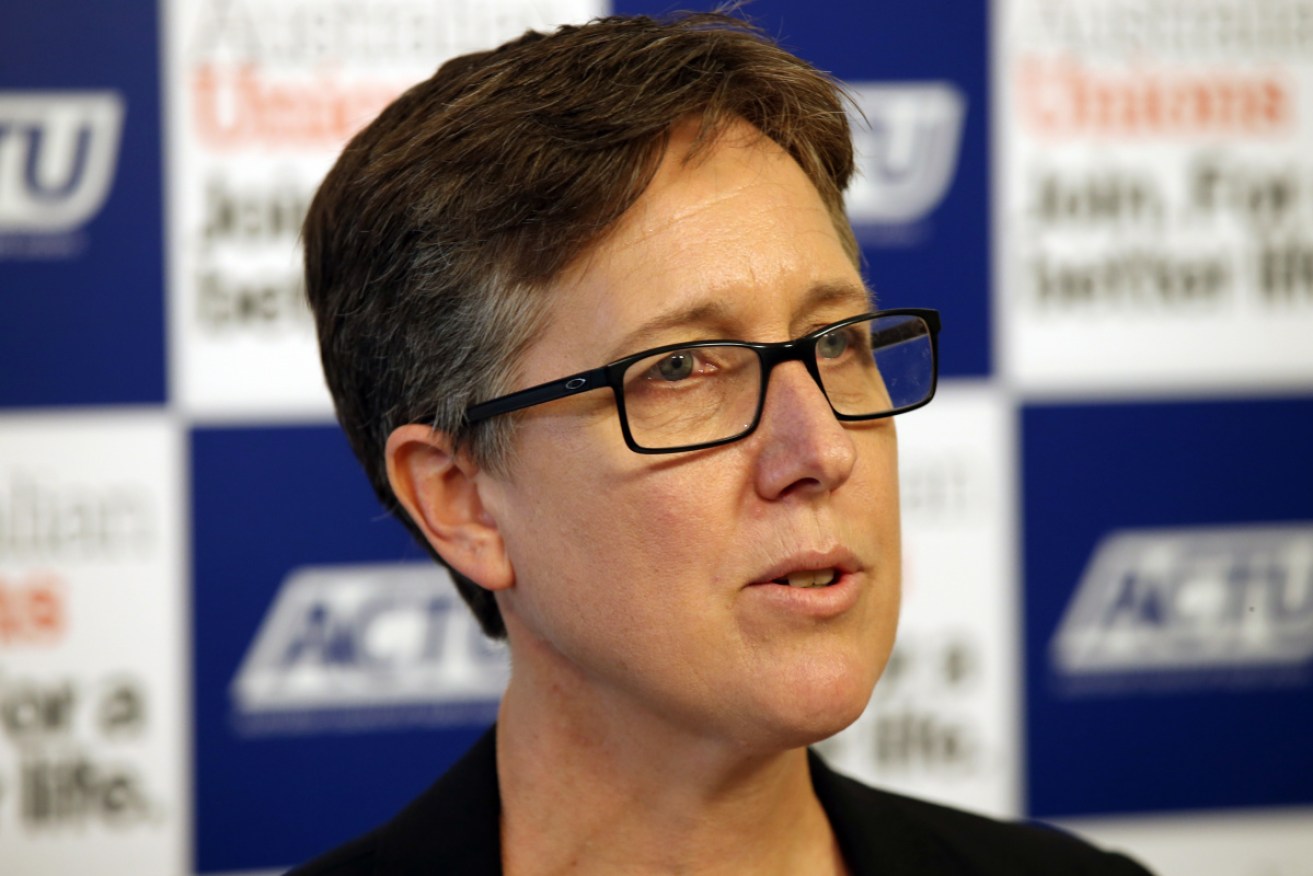Unions blast Scott Morrison over rapid test ‘failure’ to protect workers


ACTU secretary Sally McManus. Photo: AAP
National cabinet’s plans to water down COVID-19 isolation rules for essential staff are “not a solution” to supply chain issues, according to unions, with leader Sally McManus blasting Scott Morrison over a “failure” to protect workers.
An expanded list of workers in critical industries will be allowed to skip COVID-19 isolation if they test negative after being a close contact, under rules agreed by state and federal leaders on Thursday.
But the Australian Council of Trade Unions said the plan would further increase risk to workers, without rapid antigen tests being made more widely available.

Scott Morrison in Canberra on Thursday. Photo: AAP
“Essential workers are being forced to put themselves in harm’s way to keep food on the shelves, medicines in stock, the lights and water on and keep this country open for business,” ACTU secretary Ms McManus said.
“The federal government’s plan to open up, if there is one, has clearly failed our health systems, our economy and the essential national supply chains.”
The Prime Minister said national cabinet had agreed on Thursday to broaden the list of essential workers who would be exempt from close contact isolation rules.
Workforce shortages of up to 50 per cent in some industries are crippling supply chains and threatening essential industries.
All workers in transport, freight and logistics will be allowed to skip COVID-19 isolation and return to work after a negative test result, in a bid to fix issues leaving supermarket shelves bare.
Other employees in health care, emergency services, law enforcement, energy, resources, water, waste management, food distribution, telecommunications, broadcasting and media, and education and child care will also be exempt.

Supermarkets don’t have enough staff to restock their shelves.
Mr Morrison said it was a “very delicate balance” between requiring more people to isolate and keeping essential services running, one that “needs to be constantly recalibrated”.
In a bid to get more workers back to work, employees would be allowed to leave isolation if they return negative test results.
But Ms McManus said unions were outraged that workers wouldn’t be given free rapid tests.
“The announcement today allowing more workers who are close contacts to attend work is not a solution to the current crisis,” the ACTU said in a statement.
“It increases risk; and could increase sickness in workplaces and across the community at a time health workers and hospitals are already overwhelmed.”
The union peak body claimed it had proposed working together with the federal government on resolving workforce issues, but that “there has been no response”.
Tweet from @unionsaustralia
“Today we have again seen the Prime Minister fail to outline a plan for free and accessible rapid antigen tests as the key measure workers and the community need to keep themselves safe and to limit the spread of Omicron. This is a major concern for all workers,” Ms McManus said.
The ACTU is convening a “crisis meeting” of union leaders for Monday, to discuss issues facing workers.
Ms McManus said on Twitter that unions would call for changes to close contact rules, upgrade face masks, provide free rapid tests to all, and restore support payments for workers affected by a so-called “unofficial lockdown”.
Labor leader Anthony Albanese echoed similar sentiments, again emphasising the Opposition’s calls for free rapid tests for all.
“We need to make sure that people can work, but they can work safely,” he told Today.
“The Transport Workers’ Union, for example, wrote to the government in September last year saying, ‘We need RATs for our workforce, otherwise there will be supply chain issues’. So, this shouldn’t have come as any surprise.
“It is extraordinary that in the third year of the pandemic we have no food on supermarket shelves.”
Tweet from @AlboMP
On Thursday, Mr Morrison said the previously announced program to give free rapid tests to concession card holders would begin from January 24.
Pharmacists have raised concerns they would have to provide those free supplies from their existing stocks that they source themselves, not out of an additional allocation provided by government.
Mr Morrison admitted free concessional access to rapid tests would be “limited”.
Ahead of the return of the school year, Mr Morrison also said national cabinet had agreed that classroom returns should be prioritised.
He said the leaders’ meeting had agreed to the principle that schools “should be first to open and last to close wherever possible, and face-to-face learning prioritised”, warning of wider knock-on effects if schools shut.
Queensland has already announced a two-week delay to the school year starting for younger students, while New South Wales and South Australia have committed to reopening schools as scheduled.
“If schools don’t open, that can add an additional 5 per cent of the absenteeism in the workforce,” the PM said.
“It is absolutely essential for schools to go back safely and remain safely open if we are not going to see any further exacerbation of the workforce challenges we are currently facing.”
However, Mr Morrison said leaders were still considering whether to give regular rapid antigen tests to children and staff in schools, with states “working through some arrangements” ahead of further discussions about surveillance testing.
He said he hoped exploding COVID case numbers around the country were nearing a peak, and stressed the importance of vaccination and booster shots.
“The goal is not to stop everyone in the country getting COVID,” the PM said.
“The goal is to protect our hospitals and keep our society and economy functioning as we ride this latest wave of Omicron.”
Earlier in the day, Victorian Premier Daniel Andrews announced his state would further relax isolation rules for essential workers.
The changes, effective from next Tuesday, allow workers in emergency services, education, critical utilities, custodial facilities, transport and freight to skip isolation if they are close contacts but record negative rapid test results.
Such workers will have to get tested five days in a row, wear masks at all times, and both employee and employer must consent to them returning to work.
The worker must be “necessary for continuity of operations”, can’t use shared break areas, and employers must take “reasonable steps” to deploy the worker in lower-risk transmission areas.
If eventually testing positive, the worker must cease work.








